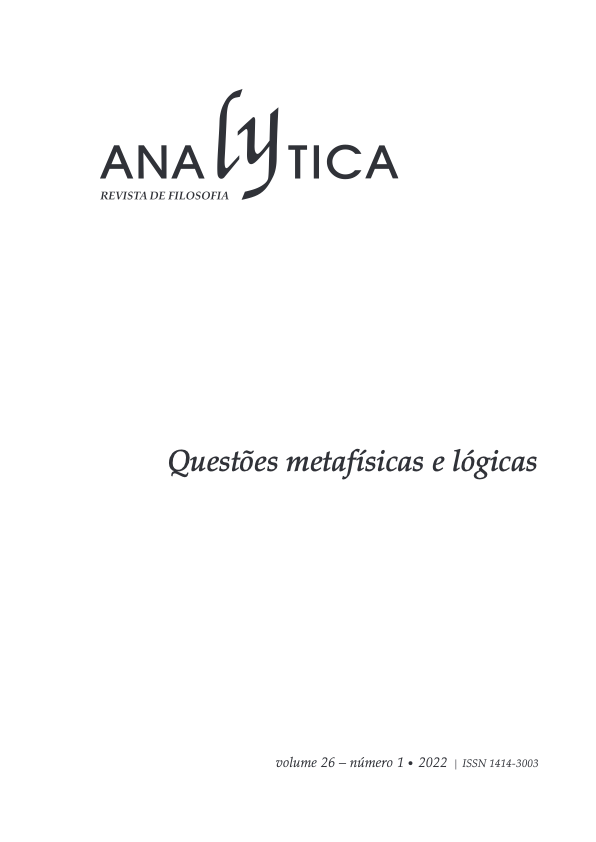Frege and Wittgenstein's Debate Regarding the Notion of "Fact"in the Tractatus
Is it a Set-Theorist or a Mereological Notion?
Palavras-chave:
Wittgenstein, Frege, Set theory, Fact, Teoria dos Conjuntos, Merealogia, MereologyResumo
A preencher
Downloads
Referências
ARISTOTLE. (n.d.). Metaphysics. In W. D. Ross, & W. D. Ross (Ed.), Aristotle - Works. Oxford: Clarendon Press.
ARMSTRONG, D. (1986, 4). The Nature of Possibility. Canadian Journal of Philosophy, 16, pp. 577-594.
BRADLEY, R. (1992). The Nature of All Being A Study of Wittgenstein's Modal Atomism. New York, Oxford: OXFORD UNIVERSITY PRESS.
CARNAP, R. (1952, October). Meaning Postulates. Philosophical Studies: An International Journal for Philosophy in the Analytic Tradition, 3(n. 5), pp. 65-73.
CARNAP, R. (1956). Meaning and Necessity. Chicago: Chicago University Press.
CARNAP, R. (2003 (1928)). The Logical Structure of the world and Pseudoproblems in Philosophy. Chicago and La Salle, Illinois: Open Court .
CASATI, R., & VARZI, A. (1999). Parts and Places: the structure of spatial representation. Cambridge, Massachusetts; London, England.: The MIT Press.
CHATEAUBRIAND, O. (2001). Logical Forms Part I - Truth and Descriptions (Vol. I). Campinas, São Paulo: Itala M. Loffredo D'Ottaviano.
COOK, R. T. (2013). Appendix: How to read Grundgesetze. In G. FREGE, Basic Laws of Arithmetic - Volume I and II (pp. A1-A17). Oxford: Oxford University Press.
DUMMETT, M. (1996). The Seas of Language. Oxford: Claredon Press.
FRASCOLLA, P. (2000). Understanding Wittgenstein's Tractatus. London and New York: Routledge.
FREGE, G. (1879). Begriffsschrift, a formula language, modeled upon that of arithmetic, for pure thought.
FREGE, G. (1953). The Foundations of Arithmetic. (J. L. AUSTIN, Trans.) Oxford: Basil Blackwell.
FREGE, G. (1977). Logical Investigations. Bristol: Oxford Basil Blackwell.
FREGE, G. (1977). Translations from Philosophical Writings of Gottlob Frege. Oxford: Basil Blackwell.
FREGE, G. (1979). Logics in Mathematics. In G. Frege, Gottlob Frege - Posthumous Writings (pp. 203-250). Oxford: HANS HERMES, FRIEDRICH KAMBARTEL and FRIEDRICH KAULBACH.
FREGE, G. (2003, Novembro). Frege's Letters to Wittgenstein about the Tractatus. (B. R. Society, Ed.) The Bertrand Russell Society Quarterly, 120, pp. 13-31.
FREGE, G. (2013). Basic Laws of Arithmetic (Vol. I & II). (M. R. Philip A. Ebert, Ed.) Oxford, Oxford, United Kingdom: Oxford University Press.
GREIMANN, D. (2007). DID FREGE REALLY CONSIDER TRUTH AS AN OBJECT? Grazer Philosophische Studien, 75 (1), pp. 125-148.
GRIFFIN, J. (1964). Wittgenstein's Logical Atomism. Oxford: Oxford University Press.
HEMPEL, C. G. (1959). The Empiricist Criterion of Meaning. In A. J. AYER, Logical positivism (pp. 108-132). A. J. AYER.
LANDO, G. (2007). TRACTARIAN ONTOLOGY: MEREOLOGY OR SET THEORY? FORUM PHILOSOPHICUM, 12, pp. 247-266.
LEIBNIZ, G. W. (n.d.). New Essays on Human Understanding. (P. R. BENNETT, Ed.)
LEONARD, H. S., & GOODMAN, N. (1940, jun). The Calculus of Individuals and Its Uses. The Journal of Symbolic Logic, pp. 45-55.
NOVAES, D., & C., R. E. (2017). Carnapian explication, formalisms as cognitive tools, and the paradox of adequate formalization. Synthese, 194, pp. 195–215.
QUINE, W. (1996). Two Dogmas of Empiriscism. In W. V. QUINE, From a Logical Point of View (pp. 20-46). Cambridge: Harvard University Press.
QUINE, W. V. (1963). Set Theory and its Logic. London: Harvard University Press.
QUINE, W. V. (1996). Two Dogmas of Empiriscism. In W. V. QUINE, From a Logical Point of View (pp. 20-46). Cambridge: Harvard University Press.
SCHLICK, M. (1959). Positivism and Realism. In A. J. Ayer, Logical Positivism (pp. 82-107). New York: The Free Press.
SIMONS, P. (1987). Parts: A Study in Ontology. Oxford: Claredon Press.
TREBAUL, D. (Sep 2012). The early Wittgenstein’s truth-conditional conception of sense in the light of his criticism of Frege. In M. Karlsson, Wittgenstein's footsteps (Vols. halshs- 01532039, pp. 1-10). Iceland: Reykjavik.
VELLOSO, A. (2009, jul./dez.). Os paradoxos da identidade e seu papel como limitadores de uma teoria funcional da linguagem. Princípios, 16(n.26), pp. 05-34.
VELLOSO, A. (2014). Wittgenstein’s unique “Great Analysis”. Analytica, 18(nº 1), pp. 229-269.
WITTGENSTEIN, L. (1074). Philosophical Grammar. Oxford: Blackwell.
WITTGENSTEIN, L. (1957, Apr. 25). Notes of Logic. The Journal of Philosophy, 54, pp. 230-245.
WITTGENSTEIN, L. (1961). Notebooks 1914-16. Bssil Blackwell.
WITTGENSTEIN, L. (1961). Tractatus Lógico-Philosophicus. (D. PEARS, & B. McGUINESS, Trans.) London and Henley: Routledge & Kegan Paul.
WITTGENSTEIN, L. (1976). Lectures on the Foundations of Mathematics 1939. (C. Diamond, Ed.) HASSOCKS: THE HARVESTER PRESS, LTD.
WITTGENSTEIN, L. (1993). Some remarks on logical form. In L. WITTGENSTEIN, J. KLAGGE, & A. NORDMANN (Eds.), Philosophical Occasion 1912-1951 (pp. 29-35). indianapolis & Cambridge: Hackett Publishing Company.
WITTGENSTEIN, L. (2001). Philosophical Investigations. (G. ANSCOMBE, Trans.) Oxford: Blackwell Publishing.
WITTGENSTEIN, L. (2001). Wiener Ausgabe Studien Texte (Band 1 - 5). Springer-Verlages/Wien: Michael Nedo.
WITTGENSTEIN, L. (2005). The Big Typescript TS 213. (C. G. Aue, Ed.) Malden, MA: Blackwell Publishing.
Downloads
Publicado
Como Citar
Edição
Seção
Licença
Copyright (c) 2024 Araceli Velloso

Este trabalho está licenciado sob uma licença Creative Commons Attribution-NoDerivatives 4.0 International License.
Os autores que publicam nesta revista concordam com os seguintes termos:
- Os autores mantêm os direitos autorais e concedem à revista o direito de primeira publicação, com o trabalho simultaneamente licenciado sob a Licença Creative Commons Atribuição-SemDerivações 4.0 Internacional (CC BY-ND 4.0), que permite a redistribuição, comercial ou não comercial, desde que a obra original não seja modificada e que seja atribuído o crédito ao autor.
- Os autores têm autorização para assumir contratos adicionais separadamente para distribuição não-exclusiva da versão do trabalho publicada nesta revista (ex.: publicar em repositório institucional ou como capítulo de livro), com reconhecimento de autoria e publicação inicial nesta revista.
- Os autores têm permissão e são estimulados a publicar e distribuir seu trabalho online (ex.: em repositórios institucionais ou na sua página pessoal) a qualquer ponto antes ou durante o processo editorial, já que isso pode gerar alterações produtivas, bem como aumentar o impacto e a citação do trabalho publicado (Veja O Efeito do Acesso Livre).


